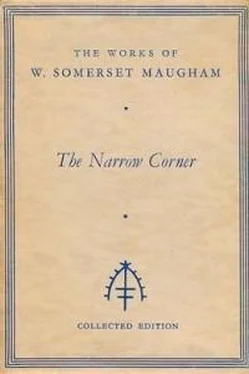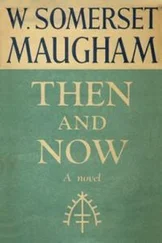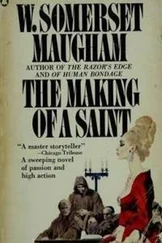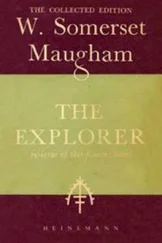“The old Dutch merchants were so rich here in the great days of the spice trade, they didn’t know what to do with their money. There was no cargo for the ships to bring out and so they used to bring marble and use it for their houses. If you’re not in a hurry I’ll show you mine. It used to belong to one of the perkeniers. And sometimes, in winter, they’d bring a cargo of nothing but ice. Funny, isn’t it? That was the greatest luxury they could have. Just think of bringing ice all the way from Holland. It took six months, the journey. And they all had their carriages, and in the cool of the evening the smart thing was to drive along the shore and round and round the square. Someone ought to write about it. It was like a Dutch Arabian Nights Tale. Did you see the Portuguese fort as you came in? I’ll take you there this afternoon. If there is anything I can do for you, you must let me know. I shall be very glad.”
“I shall get my traps,” said the doctor. “These gentlemen have very kindly given me a passage here. I don’t want to put them out more than I can help.”
Erik Christessen beamed amiably on the other two. “Ah, that is what I like in the East. Everyone is so nice. Nothing is too much trouble. You cannot imagine the kindness I’ve received at the hands of perfect strangers.”
The four of them got up and the Dane told the half–caste manager that Dr. Saunders would be coming along in a little while with his luggage and his boy.
“You should have tiffin here. It is reistafel to–day, and they make it very well. I shall be here.”
“You two fellows had better have tiffin with me,” said the doctor.
“ Reistafel’s death to me,” said Captain Nichols. “But I don’t mind sittin’ and watch you eat it.”
Erik Christessen solemnly shook hands with the three of them.
“I’m so very glad to have met you. It’s not often we get strangers on the island. And it’s always a pleasure to me to meet English gentlemen.”
He gave them a bow as they separated at the bottom of the steps.
“Intelligent chap, that,” said Captain Nichols when they had walked a little. “Knew we was gentlemen at once.”
Dr. Saunders gave him a glance. There was no trace of irony in his expression.
A COUPLE of hours later, the doctor having settled in, he and his guests off the Fenton were sitting on the verandah of the hotel drinking a glass of Schnapps before tiffin.
“The East ain’t what it was,” said the skipper, shaking his head. “Why, when I was a young chap, at Dutch ’otels there’d be bottles of Schnapps on the table, at tiffin and dinner, and you just ’elped yourself. Free of charge it was. And when you’d finished the bottle you told the boy to bring another.”
“Must have come expensive.”
“Well, you know, that’s the funny thing, it didn’t. You very seldom found a chap as took advantage of it. Human nature’s like that. Treat a man proper and ’e’ll respond wonderfully. I believe in ’uman nature, I always ’ave.”
Erik Christessen came up the steps, took off his hat to them and was passing into the hotel.
“Come and have a drink with us,” called Fred.
“With pleasure. I’ll just go in and wash first.”
He went in.
“Hulloa, what’s this?” said the skipper, eyeing Fred slyly. “I thought you didn’t like strangers?”
“It depends. Seems rather a good sort to me. He never asked us who we were or what we were doing here? Generally everyone’s so curious.”
“He has naturally good manners,” said the doctor.
“What’ll you have?” asked Fred when the Dane rejoined them.
“The same as you.”
He dropped his ungainly bulk into a chair. They began to chat. He said nothing that was very clever or amusing, but there was a guilelessness in his conversation that made it pleasing. He filled you with confidence. He irradiated well–being. Dr. Saunders did not judge hastily, and he mistrusted his instincts, but this he could not miss and, reflecting upon it, he could ascribe it to nothing but an amazing and delightful sincerity. It was quite obvious that Fred Blake was much taken with the huge Dane. Dr. Saunders had never heard him talk so easily.
“Look here, you’d better know our names,” he said after a few minutes. “Mine’s Blake, Fred Blake, and the doctor’s called Saunders, and this fellow is Captain Nichols.”
Somewhat absurdly Erik Christessen got up and shook hands all round.
“I’m very pleased to make your acquaintance,” he said. “I hope you’re going to stay here a few days.”
“Are you still sailing to–morrow?” asked the doctor.
“Nothing to stay for. We saw a dinghy this morning.”
They went into the dining–room. It was cool and dim. Punkahs drawn by a small boy fitfully stirred the air. There was one long table, and at one end of it were sitting a Dutchman with a half–caste wife, a stout woman in loose pale draperies, and another Dutchman with a dark enough skin to suggest that he, too, had native blood in him. Erik Christessen exchanged polite greeting with them. They gave the strangers an incurious stare. Reistafel was served. They piled their plates with rice and curry, fried eggs, bananas and a dozen strange concoctions that boys kept bringing them. When everything was handed they were faced with a mountain of food. Captain Nichols looked at his with profound distaste.
“This’ll be my death,” he said solemnly.
“Don’t eat it, then,” said Fred.
“I must keep up me strength. Where would you be now if I ’adn’t ’ad me strength when we struck that bad weather? It’s not for my sake I’m eatin’ it. It’s for yours. I don’t take a job unless I know I can do it, and not me worst enemy can say I spare meself.”
Gradually the piles of food diminished, and Captain Nichols with stubborn determination cleaned up his plate.
“God, we haven’t had a meal like this for weeks,” said Fred.
He ate voraciously, with a boy’s appetite, and enjoyed his food. They drank beer.
“If I don’t suffer for this it’ll be a miracle,” said the skipper.
They had their coffee on the verandah.
“You’d better have a sleep now,” said Erik, “and then when it’s cooler I’ll come round and show you the sights. Pity you’re not staying a bit longer. It’s a beautiful walk up the volcano. You can see for miles. The sea and all the islands.”
“I don’t see why we shouldn’t stay till the doctor sails,” said Fred.
“Suits me,” said the skipper. “After all the ’ardships of life on the ocean wave this is a bit of all right. I’m not sure if a drop of brandy wouldn’t settle that reistafel now I come to think of it.”
“Trading, I suppose?” asked the Dane.
“We’re prospectin’ for shell,” said the skipper. “Got to find some new beds. There’s a fortune for anyone who’s lucky.”
“D’you have any papers here?” asked Blake. “In English, I mean.”
“Not London papers. But Frith gets a paper from Australia.”
“Frith. Who’s Frith?”
“He’s an Englishman. He gets a bundle of ‘Sydney Bulletins’ every mail.”
Fred went strangely pale, but what the emotion was that blanched his cheek, who could tell?
“D’you think there’s a chance of my having a squint at them?”
“Of course. I’ll borrow them or I’ll take you up there.”
“How old’s the latest?”
“It oughtn’t to be very old. A mail came in four days ago.”
LATER, when the heat of the day was passed and his own work finished, Erik fetched them. Dr. Saunders was sitting alone with Fred, for the skipper, suffering from a violent attack of indigestion, had announced that he didn’t want to see no bloody sights and had returned to the lugger. They sauntered through the town. There were more people about than in the morning. Now and then Erik took off his hat to a sunburned Dutchman who walked with a stout and listless wife. There were few Chinese, for they do not settle where no trade is, but a number of Arabs, some in smart tarbouches and neat suits of duck, others in white caps and sarongs; they were dark–skinned, with large shining eyes, and they had the Semitic look of the merchants of Tyre and Sidon. There were Malays, Papuans and half–castes. It was strangely silent. The air was heavy with fatigue. The grand houses of the old perkeniers, in which dwelt now the riff–raff of the East from Baghdad to New Hebrides, had the shame–faced look of respectable citizens who could not pay their rates. They came to a long white wall, all crumbling away, and this once had been a Portuguese monastery; and then to a ruined fort of great grey stones overrun with a wild jungle of trees and flowering shrubs. There was a wide space in front of it, facing the sea, where grew huge old trees, planted it was said by the Portuguese, casuarinas, kanaris and wild figs; and here, after the heat of the day, they had been used to ramble.
Читать дальше
Конец ознакомительного отрывка
Купить книгу










